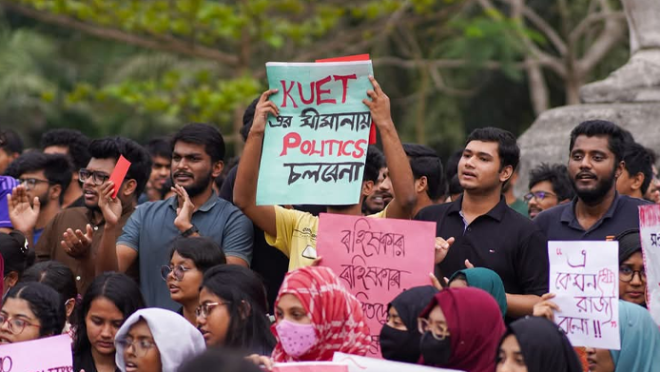KUET’S outcry for change: Mass unrest over the demand of an apolitical campus and indefinite shut down
KUET’S outcry for change: Mass unrest over the demand of an apolitical campus and indefinite shut down

Khulna University of Engineering and Technology (KUET), once known as a hub of academic excellence and innovation, has been plunged into chaos following disturbing events that have traumatised the student community. On 17 February, the Facebook post of Chatrodol members accepting entrance forms from KUET students sparked the initial flag, as it is assumed that campus politics had been a widely debated issue even before that day, and a significant fraction of the students decided to organise and voice their frustrations the following day on 18 February 2025.
The campus witnessed a horrifying incident when a group of armed individuals, allegedly affiliated with a political faction known as Chatradal, launched a brutal attack on the students when they were leading a procession. The attackers, armed with guns and other prohibited weapons, targeted innocent students in their academic environment. The violence left more than 150 students injured, many of whom sustained severe internal injuries. Medical reports indicate that some of the victims may require more than a year to recover, casting a shadow over their academic futures. The incident has raised serious concerns about the safety and security of students on campus, as well as the role of the university administration in protecting its students.
In the aftermath of the attack, the whole campus felt a sense of agitation mainly because outsiders were heavily involved in breaking the campus boundaries and coming in with weapons, and the proctor, as well as the VC, failed to control the situation. Students have expressed deep frustration and anger towards the university administration, particularly Vice-Chancellor Professor Dr Mohammad Mashud, for failing to stand by them during the crisis. Instead of addressing the students’ concerns and ensuring their safety, the VC sought refuge, leaving them to fend for themselves. This perceived abandonment had further eroded trust between the student body and the administration.
Following the brutal incident, the students of KUET presented a six-point motion to the university authorities. The motion included the immediate resignation of Vice-Chancellor Professor Dr Mohammad Mashud and a permanent ban on political activities within the campus to ensure a safe and apolitical academic environment.
On 19 February, students took to the campus walls to express their grievances through graffiti, demanding justice, safety, and an apolitical academic environment. However, instead of engaging in dialogue or offering support, the university authorities responded by issuing notices to vacate student halls. In a move that has been widely criticised, the administration also cut off water and Wi-Fi services, exacerbating the students’ distress. The act of defiance on the part of the proctorial body further eroded trust among the students, for they expected a more responsible and mature approach to their logical demands.
Time and time again, the administrative apparatus of KUET failed to acknowledge the dire crisis which plagued the campus. The general mood long before 5 August had been to ban student politics just as BUET did, although, after 5 August, the students had breathed a sigh of relief that the newly strengthened Chatrodol had taken up the old campus culture of domination and censorship duties. This fact triggered the students even before 18 February as chatter on the campus expressed general dissatisfaction with Chatrodol and their activities.
On 28 February, the university authorities erased all the graffiti from the campus walls, effectively silencing the students’ voices. This action has been perceived as an attempt to suppress dissent rather than address the underlying issues that have led to the current unrest. The students have strongly condemned this act, calling it a blatant disregard for their rights and freedom of expression. They have vowed to continue their protest, stating, “The tyrannies of today will see their fall, just as they have throughout history.”


